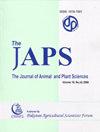Ethnobotanical study of medicinal plants used against sickle cell anaemia in the eastern part of the Côte d’Ivoire
IF 0.5
4区 生物学
Q3 AGRICULTURE, MULTIDISCIPLINARY
引用次数: 6
Abstract
An ethnobotanical survey was conducted to record the various plant families, species, and plant parts used to manage sickle cell disease in the Indenié-Djouablin region eastern Côte d’Ivoire. Nine traditional healers aged 36 to 67 years old were selected in six different villages according to their reputation in knowledge of traditional medicine, their availability and their willingness to share information. A total of 26 species of plants belonging to 20 families were reported to have antisickling activity. Eleven (11) different medication recipes were composed from these 26 species of plants ((Afromonum melegueta (Roscoe) K. Schum., Xylopia aethiopica) mainly). The main plant parts used were stem bark (38%) followed by fruit (18%) and seeds (18%). The majority of the main plants recorded (84.61 %) were wild. From the recorded plants, 65.38 % were trees and 23.07 % shrubs. Most remedies (82%) were made up by decoction and were employed orally (54 %) or by enema (32 %). The potential anti-sickling activity of the plant species recorded during this study could be the effect of alkaloids, polyphenols, quinones and terpenoids compounds found during the phytochemical screening of the 26 plants species.在Côte科特迪瓦东部用于治疗镰状细胞贫血的药用植物的民族植物学研究
进行了一项民族植物学调查,以记录在Côte科特迪瓦东部的indinimim - djouablin地区用于管理镰状细胞病的各种植物科、物种和植物部分。根据他们在传统医学知识方面的声誉、他们的可用性和他们分享信息的意愿,从六个不同的村庄选出了9名年龄在36至67岁之间的传统治疗师。据报道,共有20科26种植物具有抗镰刀病活性。从这26种植物(Afromonum melegueta (Roscoe) K. Schum)中合成了11种不同的药物配方。(主要是埃塞俄比亚木皮)。使用的主要植物部位是茎皮(38%),其次是果实(18%)和种子(18%)。记录的主要植物以野生植物居多(84.61%)。其中乔木占65.38%,灌木占23.07%。大多数补救措施(82%)由汤剂组成,口服(54%)或灌肠(32%)。本研究记录的26种植物的潜在抗镰刀病活性可能是在植物化学筛选过程中发现的生物碱、多酚、醌和萜类化合物的作用。
本文章由计算机程序翻译,如有差异,请以英文原文为准。
求助全文
约1分钟内获得全文
求助全文
来源期刊

Journal of Animal and Plant Sciences
Multiple-
CiteScore
1.50
自引率
0.00%
发文量
128
审稿时长
6 months
期刊介绍:
The Journal of Animal and Plant Sciences (JAPS) is a bi-monthly publication and is being published regularly since 1991 by the Pakistan Agricultural Scientists Forum (PAS FORUM). It publishes original research papers, review, extension/clinical articles on all aspects of animal (including fisheries/wildlife) and plant sciences, agricultural economics, rural sociology and other related subjects. The journal is read, abstracted and indexed by the abstracting/indexing agencies of international repute.
 求助内容:
求助内容: 应助结果提醒方式:
应助结果提醒方式:


